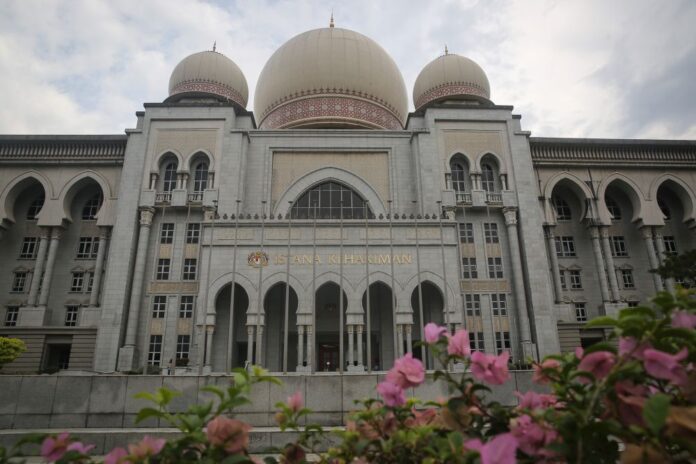A general view of the Federal Court in Putrajaya December 14, 2020. — Picture by Yusof Mat Isa
PUTRAJAYA, Oct 12 — The Federal Court here today reserved its decision on a legal action brought by SIS Forum (Malaysia) to challenge a Selangor Islamic Enactment provision which empowered state Shariah High Court to review fatwa issued by the state religious authorities.
A nine-member panel chaired by Chief Justice Tun Tengku Maimun Tuan Mat reserved judgment after hearing submissions by counsel Datuk Malik Imtiaz Sarwar who appeared for SIS as the petitioner and Selangor state legal advisor Datuk Salim [email protected] who represented the Selangor state government as the respondent.
Counsel Zainur Zakaria and Mohamed Haniff Khatri Abdulla who acted for the Selangor Islamic Religious Council (MAIS) as interveners also submitted during the virtual proceedings.
“We will CAV (curia advisari vult) for the matter. We adjourn this case,” said Justice Tengku Maimun.
The others on the bench were Court of Appeal president, Tan Sri Rohana Yusuf; Chief Judge of Malaya, Tan Sri Azahar Mohamed; Chief Judge of Sabah and Sarawak, Datuk Abang Iskandar Abang Hashim and Federal Court judges Datuk Seri Mohd Zawawi Salleh, Datuk Vernon Ong Lam Kiat, Datuk Zaleha Yusof, Datuk Harmindar Singh Dhaliwal and Datuk Rhodzariah Bujang.
On September 22 last year, the Apex Court allowed SIS’s application to obtain leave to pursue its legal challenge in the Federal Court through Article 4 (4) of the Federal Constitution.
SIS sought leave to commence the challenge seeking to declare Section 66A of the Administration of the Religion of Islam (State of Selangor) Enactment 2003 invalid.
Section 66A states that the Shariah High Court may, in the interest of justice, on the application of any person, have the jurisdiction to grant permission and hear the application for judicial review on the decision made by the Majlis (council) or committees carrying out the functions under this Enactment.
At the outset, Malik Imtiaz submitted that the power of judicial review was intrinsic and inherent in the judicial power of the civil courts.
“This power is exclusively vested in the civil courts. Such power can only be exercised by the courts established under Part XI of the Federal Constitution. As noted in Indira Gandhi’s case, Shariah Courts are not such courts and therefore cannot exercise the power of judicial review,” the lawyer said.
SIS filed the application in January this year and named the Selangor state government as the respondent.
The High Court in Kuala Lumpur, on August 27, last year dismissed SIS’s judicial review application to challenge the decision of the Selangor Fatwa Committee which declared it a deviant organisation that had deviated from the true teachings of Islam.
The then High Court judge Datuk Nordin Hassan (now Court of Appeal judge) held that the civil court has no jurisdiction pertaining to Shariah law, adding that the fatwa issue was related to Shariah law and it was under the exclusive jurisdiction of the Shariah Court.
The judge said Section 66A was an avenue to seek a judicial review against the fatwa committee in the Shariah High Court.
However, the High Court’s dismissal of SIS’s judicial review is still pending in the Court of Appeal. — Bernama


